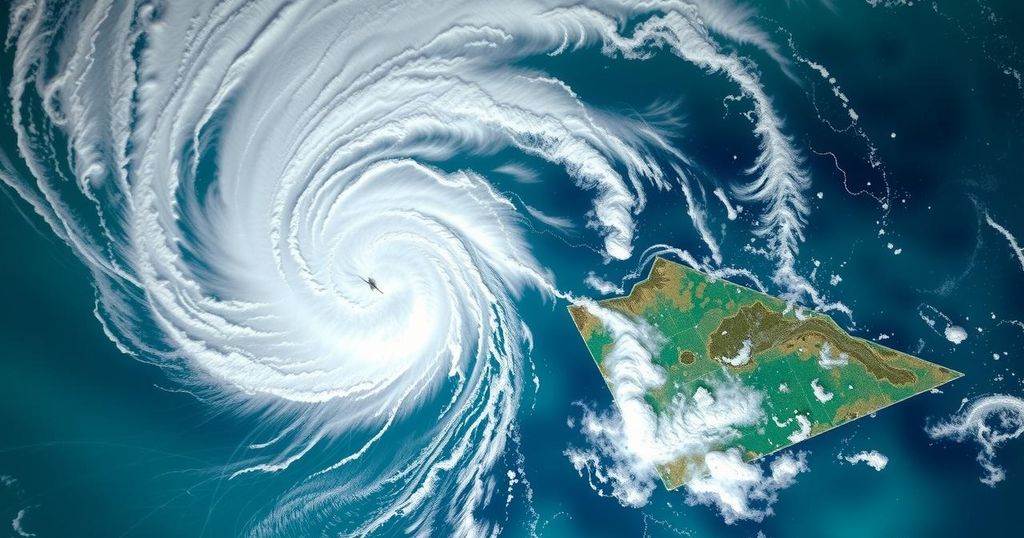Mayotte Faces New Tropical Storm After Recent Cyclone Devastation
Mayotte is experiencing severe weather conditions from Tropical Storm Dikeledi, shortly after Cyclone Chido devastated the islands. Authorities have issued a red alert, advising residents to remain indoors and seek shelter. Emergency personnel have been mobilized to respond to potential flooding and landslides, and recovery efforts are underway for the affected communities.
Mayotte, a French territory located in the Indian Ocean, is currently facing the impacts of Tropical Storm Dikeledi, which struck the islands just weeks after the devastating Cyclone Chido. This recent storm compounded the challenges for the already beleaguered populace, who are still reeling from the destruction caused by Cyclone Chido, which took at least 39 lives and left significant infrastructural devastation in its wake. The French government has advised residents to seek shelter and stock emergency supplies in anticipation of heavy rains and potential flooding associated with Dikeledi.
The situation remains dire as the Mayotte Prefecture has issued a red alert, warning residents of the high risks of flooding and landslides. This precautionary measure aims to safeguard the population as meteorologists predict that Dikeledi could potentially strengthen back into a cyclone. Emergency shelters have been reopened across the islands to accommodate those in need of refuge from the extreme weather conditions. As authorities struggle to cope with the aftermath of Cyclone Chido, which destroyed many homes, the response to Dikeledi emphasizes a heightened state of readiness to avert additional losses.
Hundreds of emergency personnel and security forces have been mobilized to assist Mayotte’s residents, particularly in the shantytown areas of Mamoudzou, which were among the hardest hit by Cyclone Chido. Tragically, the southern village of Mbouini, which had escaped much of Chido’s destruction, is now reported to have been largely flooded by Dikeledi, forcing residents to flee their submerged homes. The French government’s focus remains not only on immediate relief efforts but also on long-term recovery as the region continues to grapple with repeated climatic adversities.
Mayotte’s strategic location and socio-economic challenges exacerbate the impact of such natural disasters. The islands are home to approximately 320,000 individuals, including an estimated 100,000 undocumented migrants from neighboring states, all of whom rely heavily on both local and international assistance. The historical context of Cyclone Chido emphasizes that Mayotte has not experienced such severe natural disasters in nearly a century, which reflects the broader trends of increasingly severe weather patterns observed in the region due to climate change.
The Mayotte islands, a French overseas territory situated in the Indian Ocean, have historically been vulnerable to extreme weather phenomena, particularly during the cyclone season from November to April. In recent years, cyclones have become increasingly severe, leading to devastating consequences for local communities. Cyclone Chido, which occurred just a month prior, inflicted substantial damage with a death toll of at least 39 people and considerable infrastructural impairment, marking it as one of the most destructive cyclones in the region’s recorded history. The recurrent nature of tropical storms and cyclones in this region highlights the necessity for effective disaster preparedness and response mechanisms to safeguard the vulnerable populations in these affected areas.
In conclusion, the situation in Mayotte following the onslaught of Cyclone Chido is compounded by the arrival of Tropical Storm Dikeledi, prompting a coordinated effort from emergency services to mitigate potential dangers. The advice to residents to remain indoors and seek shelter underscores the seriousness of the weather threats posed to the territory. Furthermore, the ongoing efforts to aid a population already facing severe hardships are vital as Mayotte navigates through this challenging period, emphasizing the urgency of addressing the climate crisis affecting low-lying regions.
Original Source: www.the-journal.com




Post Comment